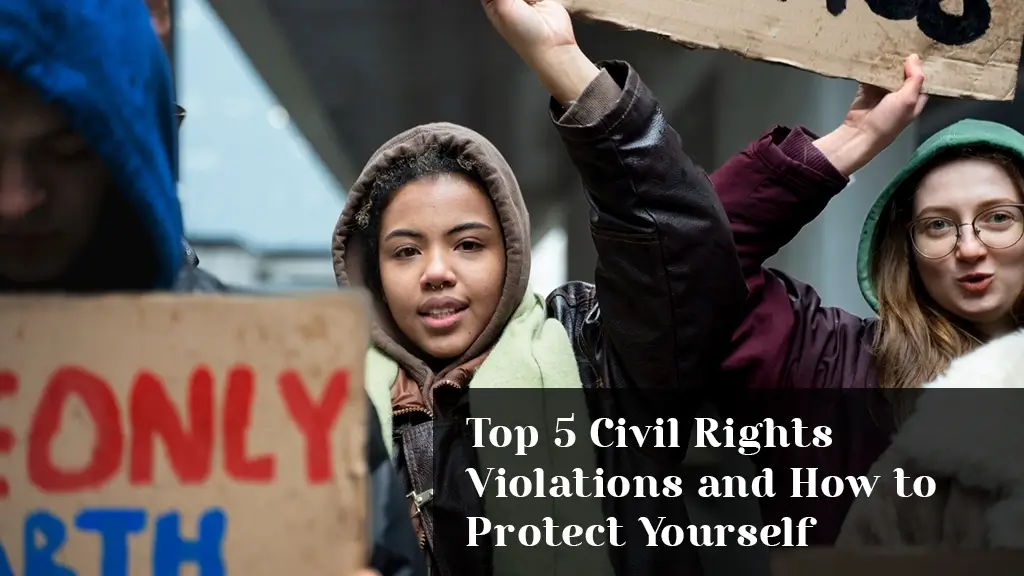Introduction
Civil rights are the fundamental rights that every individual has in society to ensure fair treatment, equality, and freedom from discrimination. In the USA, civil rights protect people from discrimination based on factors like race, gender, religion, or disability, as well as ensuring freedom of speech and equal access to opportunities. Unfortunately, civil rights violations still occur, affecting people’s lives in harmful ways. This article explores five of the most common civil rights violations in the United States and offers some advice on how to protect yourself if faced with any of these issues.

1. Racial Discrimination
Racial discrimination remains one of the most widespread civil rights violations. This can occur in various forms, from unequal treatment at work or school to being unfairly targeted by law enforcement. For instance, people of certain racial backgrounds may face greater challenges in securing jobs, housing, or loans. They might also experience unfair treatment in public places or be stopped by police without valid reasons. To protect yourself from racial discrimination, it’s essential to know your rights. If you feel you have been treated unfairly based on your race, you can contact civil rights organizations that specialize in this area or consult with a lawyer. Documenting incidents, gathering evidence, and reporting them to the Equal Employment Opportunity Commission (EEOC) or the Department of Housing and Urban Development (HUD) can also be effective steps.
2. Gender and Sexual Orientation Discrimination
Gender discrimination occurs when individuals are treated unfairly because of their gender. This can impact both men and women but often affects women more severely, especially in the workplace, where they may be paid less for the same work or be passed over for promotions. Discrimination based on sexual orientation, on the other hand, affects members of the LGBTQ+ community, who may face unequal treatment, harassment, or even denial of services. To protect yourself from discrimination based on gender or sexual orientation, educate yourself on anti-discrimination laws that apply to employment, education, and public services. For instance, in many states, it’s illegal to discriminate based on gender or sexual orientation. If you feel you’ve been a victim of this type of discrimination, you may file a complaint with the EEOC or seek support from LGBTQ+ advocacy organizations.

3. Disability Discrimination
Disability discrimination occurs when people are treated unfairly because of a physical or mental disability. This type of discrimination can happen at school, work, or even in public spaces. Some individuals might find themselves denied access to necessary accommodations, such as ramps or braille signs, or be unfairly excluded from activities or job opportunities. To protect yourself if you have a disability, familiarize yourself with the Americans with Disabilities Act (ADA), which requires organizations to provide reasonable accommodations for people with disabilities. If you experience discrimination, consider contacting disability rights groups or consulting with an ADA lawyer who can help you file a complaint and seek appropriate remedies.
4. Freedom of Speech and Expression Restrictions
In the United States, freedom of speech is a core civil right, allowing individuals to express their opinions, beliefs, and ideas freely. However, there are times when this right is restricted or violated, especially if a person’s views are unpopular or controversial. This can include censorship or punishment for speaking out against certain issues, both in public and in online spaces. Protecting yourself in situations where your freedom of speech is challenged involves understanding the limits of free speech in different environments, like schools, workplaces, or government institutions. If you believe your right to free speech has been violated, organizations like the American Civil Liberties Union (ACLU) can offer guidance, and you can also seek legal advice to explore options for defending your rights.
5. Unlawful Searches and Seizures
The Fourth Amendment protects people from unreasonable searches and seizures by the government, ensuring privacy in their homes, personal property, and communications. However, there are cases when people are subjected to unwarranted searches, such as being stopped and frisked without cause or having their homes searched without a warrant. These violations often occur within communities already facing discrimination, leading to additional stress and fear. To protect yourself against unlawful searches, it’s crucial to understand your rights during police encounters. If you are ever stopped by law enforcement, you have the right to ask if you are free to leave, to request a lawyer, and to remain silent if needed. In cases where you believe your rights have been violated, you can file a complaint with the police department or seek legal help to understand how to proceed.
Conclusion
Civil rights violations can deeply affect individuals and communities, creating barriers to equality and justice. The most common civil rights violations, such as racial and gender discrimination, disability discrimination, freedom of speech restrictions, and unlawful searches, are issues that can impact people in various aspects of life, including work, education, and daily interactions. Protecting yourself from these violations involves knowing your rights, staying informed about laws that apply to your specific situation, and seeking help when needed. Organizations like the ACLU, EEOC, and other advocacy groups are valuable resources, offering support and guidance in challenging times. By staying vigilant and taking proactive steps, individuals can better protect their civil rights and contribute to a more just and inclusive society.

